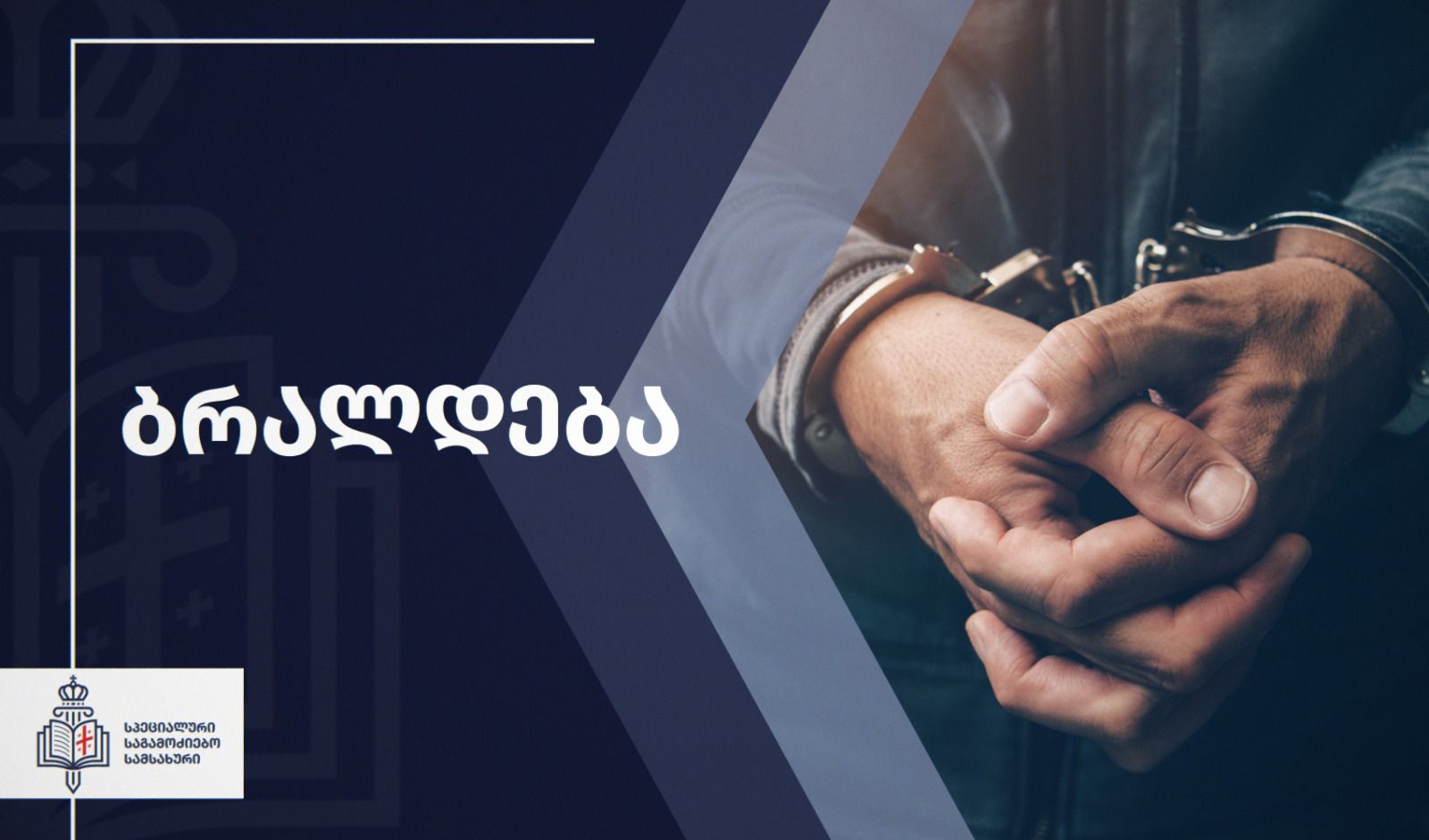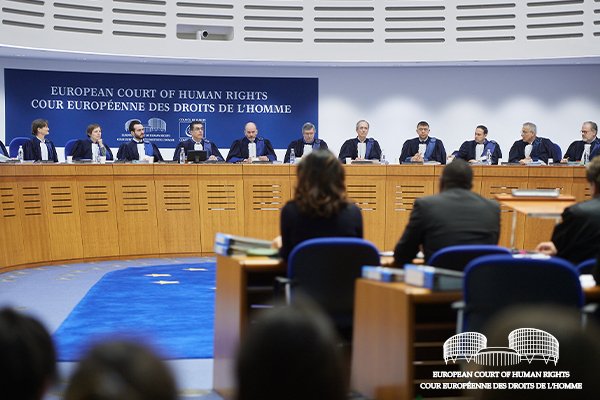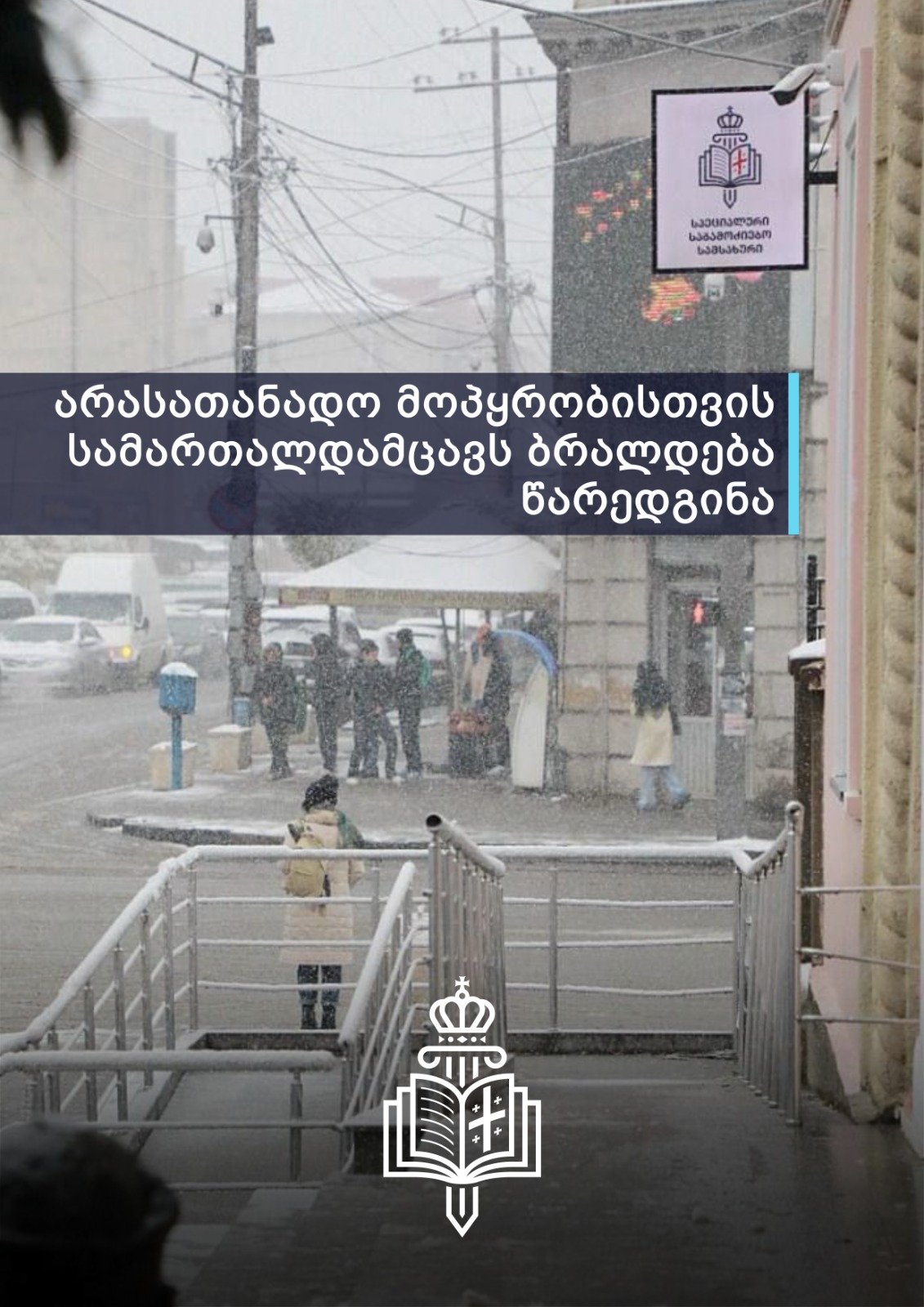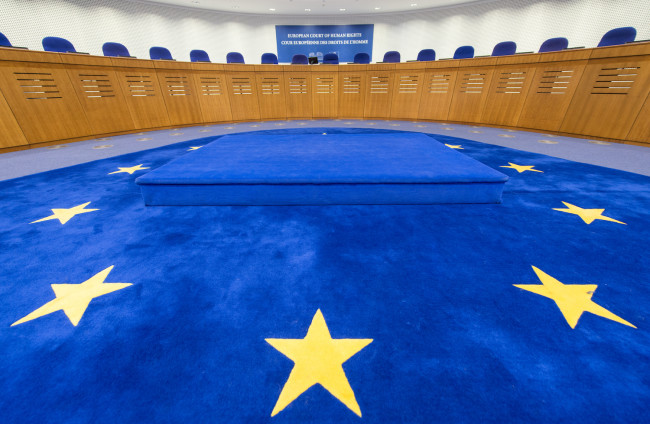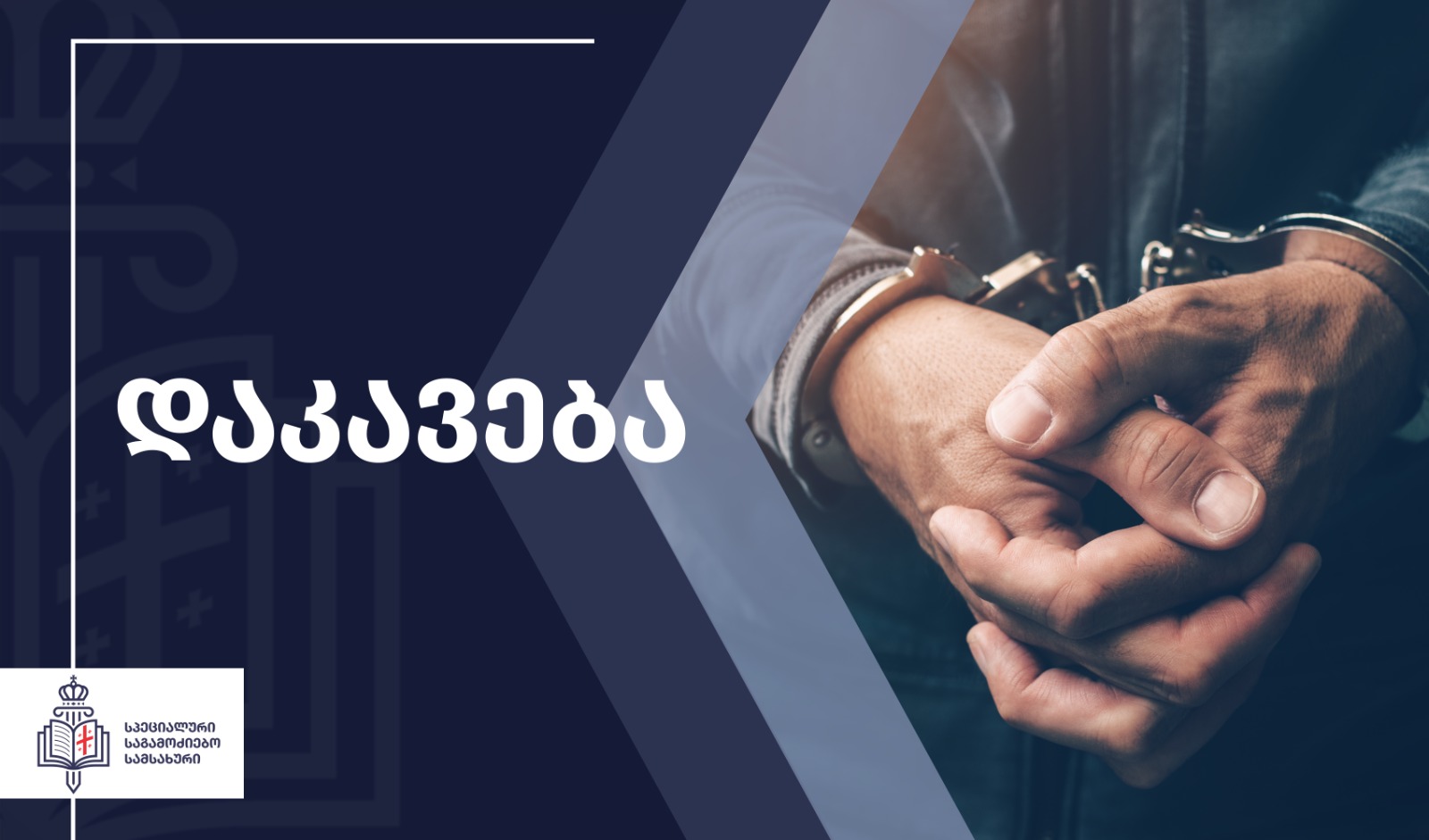ევროპის საბჭოს მინისტრთა კომიტეტის რეკომენდაციის საფუძველზე, სპეციალურმა საგამოძიებო სამსახურმა ,ცინცაბაძის ჯგუფის“ საქმეებზე გადაწყვეტილებები მიიღო
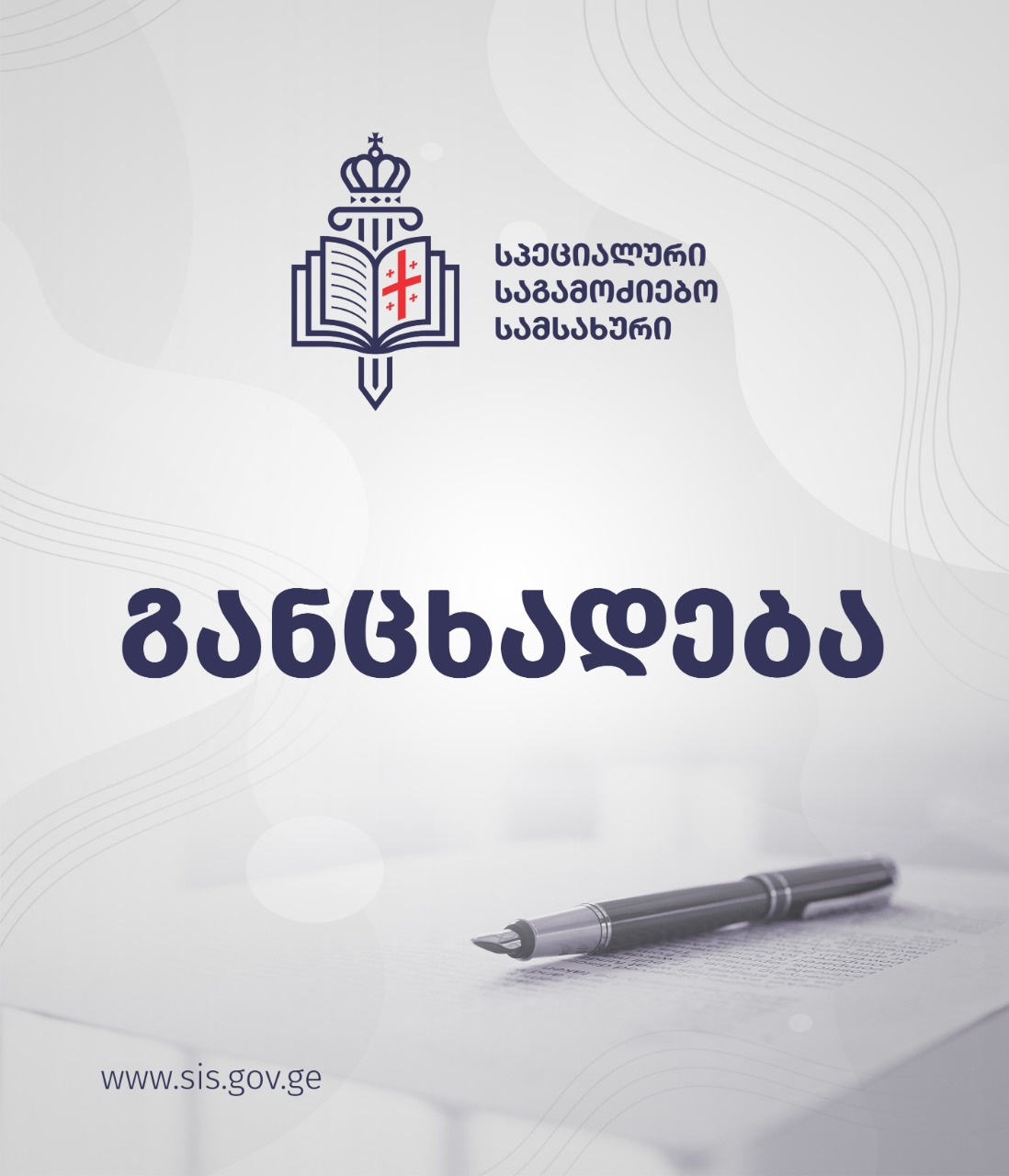
სპეციალურმა საგამოძიებო სამსახურმა, კანონით მინიჭებული უფლებამოსილების ფარგლებში, მინისტრთა კომიტეტის მიერ გაცემულ რეკომენდაციებზე დაყრდნობით, საქმის მასალებისა და ევროპული სასამართლოს გადაწყვეტილებების შესწავლისა და ანალიზის საფუძველზე, ,,ცინცაბაძის ჯგუფის“ საქმეებთან დაკავშირებით დადგენილებები გამოიტანა.
ადამიანის უფლებათა ევროპულმა სასამართლომ, „ოჩიგავა საქართველოს წინააღმდეგ“ საქმესთან დაკავშირებით, 2023 წლის 16 თებერვალს მიღებული გადაწყვეტილებით დაადგინა, რომ ადგილი ჰქონდა კონვენციის მე-3 მუხლის (წამება) დარღვევას, როგორც არსებით, ასევე პროცედურულ ნაწილში მომჩივნის არასათანადო მოპყრობასთან დაკავშირებით, რომლის ზოგიერთი ეპიზოდი გაუტოლდა წამებას.
მიუხედავად იმისა, რომ ეროვნულმა სასამართლოებმა, ოჩიგავას საქმეზე, გლდანის ციხის შვიდი თანამშრომელი სამსახურებრივი უფლებამოსილების განხორციელებისას, პატიმართა, მათ შორის მომჩივნის მიმართ სისტემატური არასათანადო მოპყრობისთვის დამნაშავედ ცნეს, რასაც ადგილი ჰქონდა 2011-2012 წლებში, ევროპულმა სასამართლომ მიიჩნია, რომ კვლავაც სახეზე იყო წამების ეპიზოდები, რომლებზედაც არ იყო დასრულებული გამოძიება.
გამოძიების ჩატარების გადაწყვეტილების მიღებისას, სპეციალურმა საგამოძიებო სამსახურმა გაითვალისწინა ევროპული სასამართლოს მოსაზრება კონვენციის მე-3 მუხლის დარღვევებთან დაკავშირებით და იმ გარემოების გათვალისწინებით, რომ ოჩიგავას მიმართ ჩადენილი არასათანადო მოპყრობის ცალკეულ ეპიზოდებთან დაკავშირებით გამოძიება ჯერ კიდევ არ დასრულებულა, მიაჩნია, რომ არსებობს ამ საქმეზე ობიექტური, ყოველმხრივი და სრულყოფილი გამოძიების წარმოებისთვის მნიშვნელოვანი საგამოძიებო და საპროცესო მოქმედებების წარმართვის პოტენციალი.
შესაბამისად, სამსახურმა სპეციალური პენიტენციური სამსახურის ცალკეული თანამშრომლების მხრიდან, აკაკი ოჩიგავას მიმართ განხორციელებული დამამცირებელი და არაადამიანური მოპყრობის ფაქტზე, საქართველოს სისხლის სამართლის კოდექსის 144³-ე მუხლის მე-2 ნაწილით გათვალისწინებული დანაშაულის ნიშნებით, გამოძიების ჩატარება/გაგრძელება, მიზანშეწონილად მიიჩნია.
რაც შეეხება საქმეს „მაჩალიკაშვილი და სხვები საქართველოს წინააღმდეგ“ ადამიანის უფლებათა ევროპულმა სასამართლომ გადაწყვეტილება 2023 წლის 19 იანვარს გამოიტანა და დაადგინა, რომ
1. სახელმწიფოს მიერ ადგილი არ ჰქონია კონვენციის მე-2 მუხლის (სიცოცხლის უფლება) არსებითი ნაწილის დარღვევას.
2. საჩივარი დაუშვებლად იქნა ცნობილი კონვენციის მე-3 მუხლის დარღვევასთან დაკავშირებით და ევროპულმა სასამართლომ ასევე განმარტა, რომ არ არსებობდა მისი განხილვის აუცილებლობა კონვენციის მე-13 მუხლის დარღვევასთან დაკავშირებით.
3. სახელმწიფოს მხრიდან დარღვევა დაფიქსირდა მხოლოდ კონვენციის მე-2 მუხლის პროცედურულ ნაწილში.
ვინაიდან მიღებული გადაწყვეტილებით ევროპულმა სასამართლომ ხსენებულ საქმეზე არ დაადგინა კონვენციის არცერთი მუხლის არსებითი დარღვევა, რაც გამოძიების განახლების პირდაპირი ვალდებულება იქნებოდა და ცნო დარღვევა მხოლოდ პროცედურულ ნაწილში, სპეციალურმა საგამოძიებო სამსახურმა მიზანშეწონილად ჩათვალა, ევროპული სასამართლოს აღნიშნული გადაწყვეტილების ეფექტური აღსრულების საუკეთესო გზის მოსაძებნად ევროპის საბჭოს მინისტრთა კომიტეტის რეკომენდაციებს დალოდებოდა და მხოლოდ მას შემდეგ მიეღო გადაწყვეტილება.
2024 წლის მარტში მინისტრთა კომიტეტმა გამოსცა რეკომენდაცია „მაჩალიკაშვილი და სხვები საქართველოს წინააღმდეგ“ საქმესთან დაკავშირებით, რომელიც არ ითვალისწინებს საქართველოს მიმართ მოწოდებას გამოძიების განახლების თაობაზე და იგი მხოლოდ აკეთებს დათქმას რომ საგამოძიებო ორგანომ განიხილოს აღნიშნული საქმე და იმსჯელოს, რამდენად მიზანშეწონილია გამოძიების განახლება.
სპეციალურმა საგამოძიებო სამსახურმა, ევროპის საბჭოს მინისტრთა კომიტეტის რეკომენდაციის ფარგლებში შესწავლის მიზნით გამოითხოვა მაჩალიკაშვილის საქმე, რომელზეც გამოძიება 2020 წლის 25 იანვარს შეწყდა. შესწავლის დასრულების შემდეგ სამსახურმა მიიღო დადგენილება, რომელშიც დეტალურად და არგუმენტირებულად არის ახსნილი, თუ რატომ ვერ ხედავს უწყება გამოძიების განახლების მიზანშეწონილობას.
ევროპულმა სასამართლომ აღნიშნა, რომ დამოუკიდებელმა საგამოძიებო ორგანომ გამოძიება დაიწყო იმავე დღეს, როცა ჩატარდა სპეცოპერაცია, ყოველგვარი შეფერხების გარეშე და გაატარა მრავალი ღონისძიება, რათა შეეგროვებინა და დაეცვა მტკიცებულებები გარდაცვალების გარემოებებთან დაკავშირებით, გამოკითხა მოვლენებში მონაწილე თითქმის ყველა პირი, პოტენციური მოწმე და ჩაატარა არაერთი მნიშვნელოვანი ექსპერტიზა. შემთხვევის ადგილის სათანადოდ დაცვის საკითხის შეფასებისას, სასამართლო დაეთანხმა იმ ფაქტს, რომ სერიოზულად დაშავებული პირისთვის პირველადი დახმარების გაწევის აუცილებლობა უპირატესია შემთხვევის ადგილის დაცვის მოთხოვნებთან შედარებით.
ევროპულმა სასამართლომ, ასევე, დადებითად შეაფასა მომჩივანთა მონაწილეობა გამოძიების პროცესში, ვინაიდან მათ ჰქონდათ საშუალება, გასცნობოდნენ გამოძიების მასალას, ხოლო მათი მოთხოვნები, საგამოძიებო მოქმედებების ჩატარებასთან დაკავშირებით დაკმაყოფილდა და სწორედ მათი მოთხოვნით დაიკითხნენ დამატებით სახელმწიფო უსაფრთხოების სამსახურის დეპარტამენტის უფროსი, უფროსის მოადგილე და ოფიცრები.
თუმცა ევროპულმა სასამართლომ საქმეზე ასევე დაადგინა ცალკეული პროცესუალური ხარვეზები, რასთან დაკავშირებითაც სამსახურმა საქმის შესწავლის შედეგად გამოტანილ დადგენილებაში თითოეული საკითხი ამომწურავად განმარტა. კერძოდ, ევროპული სასამართლოს შეფასებით, ინციდენტის შემდეგ პირველი საგამოძიებო მოქმედება ჩაატარა სახელმწიფო უსაფრთხოების სამსახურის თანამშრომელმა, რომელიც არ შეიძლება ჩათვლილიყო დამოუკიდებელ პირად. სამსახურმა აღნიშნული საკითხი შეისწავლა და განმარტა, რომ პირველადი საგამოძიებო მოქმედება დამოუკიდებელი საგამოძიებო უწყების თანამშრომლებსაც რომ ჩაეტარებინათ, მაინც იარსებებდა რისკი, რომ მტკიცებულება განადგურებულიყო, ვინაიდან შემთხვევის ადგილზე მისვლას დაჭირდებოდა გონივრული დრო და ამ დროში მტკიცებულებასთან წვდომა კვლავ ექნებოდა ოპერაციის ჩამტარებელ უწყებას. ამავდროულად ასეთ რისკებს აზღვევს საქმეზე ჩატარებული უამრავი სხვა საგამოძიებო მოქმედება.
რაც შეეხება აღნიშნული დარღვევის ნაწილში გამოძიების განახლების საკითხს, სამსახურმა მიიჩნია, რომ გამოძიების განახლება ამ კომპონენტში არაგონივრულია, ვინაიდან - ჩხრეკის ჩატარება არის შემდგარი ფაქტი და გამოძიების განახლების შემთხვევაშიც, შეუძლებელია იმავე ვითარებაში ჩატარდეს პირველადი საგამოძიებო მოქმედებები, რომელიც ხელახალი გამოძიებისთვის შედეგის მომტანი იქნება.
ევროპულმა სასამართლომ ხარვეზად მიიჩნია, რომ პროკურატურა შეზღუდული იყო ოპერაციის დაგეგმვისა და კონტროლის ფაზის შეფასებისას, რასთან დაკავშირებითაც სამსახური დადგენილებაში განმარტავს, რომ ვინაიდან სპეციალური ოპერაციის ჩატარებამდე, ჩატარებისას და ოპერაციის შემდგომ არ მომხდარა არსებული მონაცემების დოკუმენტირება და ანგარიშის შედგენა, ხელახალი გამოძიების დაწყების შემთხვევაშიც, ვერ იქნება მოპოვებული და ამოღებული ასეთი დოკუმენტები, რადგან ისინი ფიზიკურად არ არსებობს და უფრო მეტიც, მათი შედგენა, სახელმწიფო უსაფრთხოების სამსახურს სამართლებრივად არ ევალებოდა.
კიდევ ერთი გარემოება, რომელზეც ევროპული სასამართლო საუბრობს, მდგომარეობს იმაში, რომ სპეციალურ ღონისძიებაში მონაწილე და ღონისძიებასთან დაკავშირებული, სახელმწიფო უსაფრთხოების სამსახურის თანამშრომლები, გამოიკითხნენ დაგვიანებით. სამსახურმა მიიჩნია, რომ არ არსებობს რაიმე მტკიცებულება, რომ სპეცრაზმელთა დაგვიანებით გამოკითხვა იყო ვინმეს დანაშაულებრივი მიზანი ან/და ნება. გამოძიებით დადგენილია, რომ მათი გამოკითხვა დაკავშირებული იყო საიდუმლო დოკუმენტაციის გასაიდუმლოებასთან, რის შემდეგაც სამართალდამცავებს ჰქონდათ უფლება, მიეღოთ მონაწილეობა საგამოძიებო მოქმედებაში. სპეცრაზმელებმა, თუნდაც დაგვიანებით გამოკითხვის პირობებში, გამოძიებას მიაწოდეს სრულყოფილი ინფორმაცია მომხდართან დაკავშირებით.
აქვე უნდა აღინიშნოს, რომ პოზიციების შეთანხმების რისკი ჰიპოთეტურად მაინც იარსებებდა იმ პირობებში, როდესაც ისინი ერთ უწყებაში მუშაობენ და ნაცნობობის ხანგრძლივი ისტორია აკავშირებთ. შესაბამისად, გამოძიების ის მიზნები, რომლებიც დაკავშირებული იყო სპეცრაზმელთა გამოკითხვასთან და მომხდარის ირგვლივ მათგან დეტალური ინფორმაციის მიღებასთან, შესრულებულია. ამდენად, გამოძიების განახლება ამ საკითხთან დაკავშირებით არის მოკლებული გონივრულ საფუძვლებს და მიზანშეუწონელია.
ასევე, ევროპული სასამართლო მიიჩნევს, რომ მომჩივნებს არ მიეცათ სისხლის სამართლის საქმის საიდუმლო მასალაზე წვდომა, რამაც შეზღუდა მათი შესაძლებლობა მონაწილეობა მიეღოთ გამოძიებაში. სამსახურმა შეისწავლა აღნიშნული გარემოება და შეაფასა, რამდენად არის ეს გარემოება გამოძიების განახლების საფუძველი. კერძოდ, საქმის საიდუმლო მასალების მომჩივნებისთვის დაგვიანებით გაცნობას არ გამოუწვევია იმ სახის არსებითი ზიანი, რომელიც ზეგავლენას მოახდენდა გამოძიების შედეგებზე.
მხედველობაში იქნა მიღებული საიდუმლო რეჟიმის დოკუმენტებთან განსაკუთრებული და შეფასებითი მიდგომის წესი. ასევე გათვალისწინებული იქნა, რომ იმ საგამოძიებო მიმართულებებით, რომლებშიც მომჩივანი მხარის ჩართულობა შეზღუდა საიდუმლო მასალების დაგვიანებით გაცნობამ, საგამოძიებო ორგანოს ჩატარებული ჰქონდა უამრავი სხვა მოქმედება და მიიღო გონივრული ზომები საქმეზე არსებითი მნიშვნელობის გარემოებების დასადგენად. საბოლოოდ, საქმის საიდუმლო მასალებს და მასში არსებულ ინფორმაციას მომჩივანი მხარე გაეცნო. ამასთან, საქმეში არ მოიპოვება მინიშნება, რომელიც აფიქრებინებდა გამოძიებას, რომ მათი დაგვიანებით გაცნობა არის დანაშაულებრივი ქმედების შედეგი.
შესაბამისად სამსახურს მიაჩნია, რომ ვინაიდან ევროპული სასამართლოს გადაწყვეტილებით დადგენილი დარღვევები არ არის იმ ხასიათის, რომელიც გამოძიების განახლების საფუძველი გახდებოდა და აღნიშნული ხარვეზების/დარღვევების გამოსწორება შეუძლებელია, თუნდაც ახალი გამოძიების პირობებში, ხელახალი გამოძიების ჩატარება ვერ იქნება გონივრული და მიზანშეწონილი.
როგორც მაჩალიკაშვილის, ასევე ოჩიგავას საქმეებთან დაკავშირებით სამსახურის მიერ მიღებული გადაწყვეტილებები გაეგზავნება ევროპის საბჭოს მინისტრთა კომიტეტს და განმცხადებლებს.
The Special Investigation Service made decisions on the “Tsintsabadze Group” cases based on the recommendation of the Committee of Ministers of the Council of Europe
The Special Investigation Service, within the mandate granted by the law, based on the recommendations issued by the Committee of Ministers, based on the study and analysis of the case materials and the decisions of the European Court, issued resolutions regarding the cases of the "Tsintsabadze Group".
The European Court of Human Rights, regarding the case "Ochigawa v. Georgia", with its decision of February 16, 2023, established that there had been a violation of Article 3 (torture) of the Convention, both in substance and procedurally, concerning the applicant's ill-treatment, some episodes of which amounted to torture.
Despite the fact, that the national courts found seven employees of the Gldani Prison guilty of systematic ill-treatment of prisoners, including the applicant, in the course of their official duties, which took place in 2011-2012 in the Ochigawa case, the European Court considered that there were still episodes of torture in which the investigation was not completed.
When deciding to conduct the investigation, the Special Investigation Service took into account the opinion of the European Court regarding the violations of Article 3 of the Convention and, taking into consideration the fact that the investigation related to individual episodes of ill-treatment committed against Ochigawa has not yet been completed, believes that there is the potential to conduct significant investigative and procedural activities for conducting an objective, omnifaceted and comprehensive investigation into this case.
Accordingly, the service considered it expedient to conduct/continue an investigation into the fact of humiliating and inhumane treatment of Akaki Ochigawa by individual employees of the Special Penitentiary Service, with the signs of the crime provided for by 2nd part of Article 144³ of the Criminal Code of Georgia.
As for the case "Machalikashvili and Others v. Georgia", the European Court of Human Rights issued its decision on January 19, 2023, and established that:
1. There was no violation of the essential part of Article 2 (right to life) of the Convention by the state.
2. The complaint was declared inadmissible with the violation of Article 3 of the Convention and the European Court also explained that there was no need to consider it with the violation of Article 13 of the Convention.
3. Violation by the state was observed only in the procedural part of Article 2 of the Convention.
Since the decision of the European Court in the mentioned case did not establish a substantial violation of any article of the Convention, which would be a direct obligation to renew the investigation and recognize the violation only in the procedural part, the Special Investigation Service considered it appropriate to wait for the recommendations of the Committee of Ministers of the Council of Europe to find the best way to effectively implement the mentioned decision of the European Court and to make a decision only after that.
In March 2024, the Committee of Ministers regarding the case "Machalikashvili and Others v. Georgia" issued a recommendation, which did not include a call to Georgia to renew the investigation, and it only made a reservation that the investigative body should consider the case and discuss whether it is appropriate to renew the investigation.
The Special Investigation Service, within the framework of the recommendation of the Committee of Ministers of the Council of Europe, to study it requested the Machalikashvili case, the investigation of which was terminated on January 25, 2020. After the completion of the study, the service adopted a resolution in which it explained in detail and argumentatively why the agency does not see the expediency of renewing the investigation.
The European Court noted that the independent investigative body initiated the investigation on the same day as the special operation was conducted, without any delay, and carried out many measures to collect and preserve evidence regarding the circumstances of the death, interviewed almost all persons involved in the events, potential witnesses and conducted a number of important examinations. In assessing the issue of proper protection of a crime scene, the court agreed that the need to provide first aid to a seriously injured person outweighs the requirements of scene protection.
The European Court also positively evaluated the participation of the petitioners in the investigation process, since they had the opportunity to get acquainted with the investigation material, and their requests regarding the conduct of investigative actions were met, and it was at their request that the head, deputy head and officers of the State Security Service Department were additionally interviewed.
However, the European Court also identified certain procedural flaws in the case, in connection with which the service explained each of these issues exhaustively in the decision made as a result of the study of the case. In particular, according to the assessment of the European Court, the first investigative activity after the incident was conducted by an employee of the State Security Service, who could not be considered an independent person. The service studied the mentioned issue and explained that even if the employees of the independent investigative body had conducted the initial investigative activity, there would still be a risk that the evidence would be destroyed since it would take a reasonable time to arrive at the scene of the incident, and the agency conducting the operation would still have access to the evidence during this time. At the same time, such risks are insured by numerous other investigative activities conducted within the case.
As for the issue of renewing the investigation in the part of the mentioned violation, the service considered that the renewing of the investigation in this component is unreasonable since - searching is a fact, and even in the case of renewing the investigation, it is impossible to conduct the initial investigative activities in the same situation, which will bring results for the re-investigation.
The European Court considered it a flaw that the prosecutor's office was limited in the assessment of the planning and control phase of the operation, in connection with which the service explains in the resolution that since the existing data were not documented and compiled before the special operation, during the operation and after the operation, even in the event of a re-investigation, such documents cannot be obtained and seized, because they do not exist physically, and moreover, the State Security Service was not legally obliged to draw them up.
One more circumstance that the European Court talks about is that the employees of the State Security Service who participated in the special operation and were related to the event were interrogated lately. The Service considers, that there is no evidence to prove that the delayed interrogation of employees of the special forces was the criminal purpose and/or will of anyone. The investigation determined that their interrogation was related to the declassification of secret documents, after which the law enforcement officers had the right to participate in the investigative activity. The employees of the special forces, even in the conditions of the late interrogation, provided the investigation with complete information regarding the incident. It should also be noted here that the risk of agreeing positions would still hypothetically exist in the conditions when they work in the same agency and have a long history of acquaintance. Accordingly, the objectives of the investigation, which were related to the interviewing of the employees of the special forces and obtaining detailed information from them about the incident, have been fulfilled. Thus, renewing the investigation in this matter lacks reasonable grounds and is inappropriate.
Also, the European Court considers that the applicants were not given access to the secret material of the criminal case, which limited their ability to participate in the investigation. The service has studied the mentioned circumstance and assessed to what extent this circumstance is the basis for renewing the investigation. In particular, the delayed disclosure of confidential materials of the case to the applicants did not cause substantial damage of the kind that would affect the results of the investigation. The rule of special and evaluative approach to secret regime documents was taken into account. It was also considered that in those investigative directions in which the involvement of the complaining party was limited by the late disclosure of classified materials, the investigative body had conducted numerous other activities and took reasonable measures to determine the circumstances of essential importance in the case. Finally, the complaining party got acquainted with the secret materials of the case and the information contained in it. In addition to this, there is no indication in the case that would make the investigation believe that their late disclosure is the result of a criminal act.
Accordingly, the service believes that since the violations established by the decision of the European Court are not of a nature that would be the basis for renewing the investigation, and the mentioned deficiencies/violations cannot be corrected, even under the conditions of re-investigation, conducting a re-investigation will not be reasonable and appropriate.
The decisions made by the service regarding the cases of Machalikashvili and Ochigawa will be sent to the Committee of Ministers of the Council of Europe and the applicants.
განცხადებას სპეციალური საგამოძიებო სამსახური ავრცელებს.
კონსულტაციისთვის დაგვიკავშირდით
 საქართველოში
საქართველოში  598 419 416
598 419 416
თბილისი, ალ.ყაზბეგის №47 (მეტრო დელისი)
თბილისი, გურამიშვილის N23 ა (მეტრო ღრმაღელე)
 იტალიაში ქართველი ოპერატორი
იტალიაში ქართველი ოპერატორი  351 5 47 00 47
351 5 47 00 47
Italia, Bari, Piazza Nicola Balenzano, 12 A
მსგავსი სიახლეები
ევროპის საბჭოს მინისტრთა კომიტეტის რეკომენდაციის საფუძველზე, სპეციალურმა საგამოძიებო სამსახურმა, ცინცაბაძის ჯგუფის“ საქმეებზე გადაწყვეტილებები მიიღო

სპეციალურმა საგამოძიებო სამსახურმა, კანონით მინიჭებული უფლებამოსილების ფარგლებში, მინისტრთა კომიტეტის მიერ გაცემულ რეკომენდაციებზე დაყრდნობით, საქმის მასალებისა და ევროპული სასამართლოს გადაწყვეტილებების შესწავლისა და ანალიზის საფუძველზე, ,,ცინცაბაძის ჯგუფის“ საქმეებთან დაკავშირებით დადგენილებები გამოიტანა.
ადამიანის უფლებათა ევროპულმა სასამართლომ, „ოჩიგავა საქართველოს წინააღმდეგ“ საქმესთან დაკავშირებით, 2023 წლის 16 თებერვალს მიღებული გადაწყვეტილებით დაადგინა, რომ ადგილი ჰქონდა კონვენციის მე-3 მუხლის (წამება) დარღვევას, როგორც არსებით, ასევე პროცედურულ ნაწილში მომჩივნის არასათანადო მოპყრობასთან დაკავშირებით, რომლის ზოგიერთი ეპიზოდი გაუტოლდა წამებას.
მიუხედავად იმისა, რომ ეროვნულმა სასამართლოებმა, ოჩიგავას საქმეზე, გლდანის ციხის შვიდი თანამშრომელი სამსახურებრივი უფლებამოსილების განხორციელებისას, პატიმართა, მათ შორის მომჩივნის მიმართ სისტემატური არასათანადო მოპყრობისთვის დამნაშავედ ცნეს, რასაც ადგილი ჰქონდა 2011-2012 წლებში, ევროპულმა სასამართლომ მიიჩნია, რომ კვლავაც სახეზე იყო წამების ეპიზოდები, რომლებზედაც არ იყო დასრულებული გამოძიება.
გამოძიების ჩატარების გადაწყვეტილების მიღებისას, სპეციალურმა საგამოძიებო სამსახურმა გაითვალისწინა ევროპული სასამართლოს მოსაზრება კონვენციის მე-3 მუხლის დარღვევებთან დაკავშირებით და იმ გარემოების გათვალისწინებით, რომ ოჩიგავას მიმართ ჩადენილი არასათანადო მოპყრობის ცალკეულ ეპიზოდებთან დაკავშირებით გამოძიება ჯერ კიდევ არ დასრულებულა, მიაჩნია, რომ არსებობს ამ საქმეზე ობიექტური, ყოველმხრივი და სრულყოფილი გამოძიების წარმოებისთვის მნიშვნელოვანი საგამოძიებო და საპროცესო მოქმედებების წარმართვის პოტენციალი.
შესაბამისად, სამსახურმა სპეციალური პენიტენციური სამსახურის ცალკეული თანამშრომლების მხრიდან, აკაკი ოჩიგავას მიმართ განხორციელებული დამამცირებელი და არაადამიანური მოპყრობის ფაქტზე, საქართველოს სისხლის სამართლის კოდექსის 144³-ე მუხლის მე-2 ნაწილით გათვალისწინებული დანაშაულის ნიშნებით, გამოძიების ჩატარება/გაგრძელება, მიზანშეწონილად მიიჩნია.
რაც შეეხება საქმეს „მაჩალიკაშვილი და სხვები საქართველოს წინააღმდეგ“ ადამიანის უფლებათა ევროპულმა სასამართლომ გადაწყვეტილება 2023 წლის 19 იანვარს გამოიტანა და დაადგინა, რომ
1. სახელმწიფოს მიერ ადგილი არ ჰქონია კონვენციის მე-2 მუხლის (სიცოცხლის უფლება) არსებითი ნაწილის დარღვევას.
2. საჩივარი დაუშვებლად იქნა ცნობილი კონვენციის მე-3 მუხლის დარღვევასთან დაკავშირებით და ევროპულმა სასამართლომ ასევე განმარტა, რომ არ არსებობდა მისი განხილვის აუცილებლობა კონვენციის მე-13 მუხლის დარღვევასთან დაკავშირებით.
3. სახელმწიფოს მხრიდან დარღვევა დაფიქსირდა მხოლოდ კონვენციის მე-2 მუხლის პროცედურულ ნაწილში.
ვინაიდან მიღებული გადაწყვეტილებით ევროპულმა სასამართლომ ხსენებულ საქმეზე არ დაადგინა კონვენციის არცერთი მუხლის არსებითი დარღვევა, რაც გამოძიების განახლების პირდაპირი ვალდებულება იქნებოდა და ცნო დარღვევა მხოლოდ პროცედურულ ნაწილში, სპეციალურმა საგამოძიებო სამსახურმა მიზანშეწონილად ჩათვალა, ევროპული სასამართლოს აღნიშნული გადაწყვეტილების ეფექტური აღსრულების საუკეთესო გზის მოსაძებნად ევროპის საბჭოს მინისტრთა კომიტეტის რეკომენდაციებს დალოდებოდა და მხოლოდ მას შემდეგ მიეღო გადაწყვეტილება.
2024 წლის მარტში მინისტრთა კომიტეტმა გამოსცა რეკომენდაცია „მაჩალიკაშვილი და სხვები საქართველოს წინააღმდეგ“ საქმესთან დაკავშირებით, რომელიც არ ითვალისწინებს საქართველოს მიმართ მოწოდებას გამოძიების განახლების თაობაზე და იგი მხოლოდ აკეთებს დათქმას რომ საგამოძიებო ორგანომ განიხილოს აღნიშნული საქმე და იმსჯელოს, რამდენად მიზანშეწონილია გამოძიების განახლება.
სპეციალურმა საგამოძიებო სამსახურმა, ევროპის საბჭოს მინისტრთა კომიტეტის რეკომენდაციის ფარგლებში შესწავლის მიზნით გამოითხოვა მაჩალიკაშვილის საქმე, რომელზეც გამოძიება 2020 წლის 25 იანვარს შეწყდა. შესწავლის დასრულების შემდეგ სამსახურმა მიიღო დადგენილება, რომელშიც დეტალურად და არგუმენტირებულად არის ახსნილი, თუ რატომ ვერ ხედავს უწყება გამოძიების განახლების მიზანშეწონილობას.
ევროპულმა სასამართლომ აღნიშნა, რომ დამოუკიდებელმა საგამოძიებო ორგანომ გამოძიება დაიწყო იმავე დღეს, როცა ჩატარდა სპეცოპერაცია, ყოველგვარი შეფერხების გარეშე და გაატარა მრავალი ღონისძიება, რათა შეეგროვებინა და დაეცვა მტკიცებულებები გარდაცვალების გარემოებებთან დაკავშირებით, გამოკითხა მოვლენებში მონაწილე თითქმის ყველა პირი, პოტენციური მოწმე და ჩაატარა არაერთი მნიშვნელოვანი ექსპერტიზა. შემთხვევის ადგილის სათანადოდ დაცვის საკითხის შეფასებისას, სასამართლო დაეთანხმა იმ ფაქტს, რომ სერიოზულად დაშავებული პირისთვის პირველადი დახმარების გაწევის აუცილებლობა უპირატესია შემთხვევის ადგილის დაცვის მოთხოვნებთან შედარებით.
ევროპულმა სასამართლომ, ასევე, დადებითად შეაფასა მომჩივანთა მონაწილეობა გამოძიების პროცესში, ვინაიდან მათ ჰქონდათ საშუალება, გასცნობოდნენ გამოძიების მასალას, ხოლო მათი მოთხოვნები, საგამოძიებო მოქმედებების ჩატარებასთან დაკავშირებით დაკმაყოფილდა და სწორედ მათი მოთხოვნით დაიკითხნენ დამატებით სახელმწიფო უსაფრთხოების სამსახურის დეპარტამენტის უფროსი, უფროსის მოადგილე და ოფიცრები.
თუმცა ევროპულმა სასამართლომ საქმეზე ასევე დაადგინა ცალკეული პროცესუალური ხარვეზები, რასთან დაკავშირებითაც სამსახურმა საქმის შესწავლის შედეგად გამოტანილ დადგენილებაში თითოეული საკითხი ამომწურავად განმარტა. კერძოდ, ევროპული სასამართლოს შეფასებით, ინციდენტის შემდეგ პირველი საგამოძიებო მოქმედება ჩაატარა სახელმწიფო უსაფრთხოების სამსახურის თანამშრომელმა, რომელიც არ შეიძლება ჩათვლილიყო დამოუკიდებელ პირად. სამსახურმა აღნიშნული საკითხი შეისწავლა და განმარტა, რომ პირველადი საგამოძიებო მოქმედება დამოუკიდებელი საგამოძიებო უწყების თანამშრომლებსაც რომ ჩაეტარებინათ, მაინც იარსებებდა რისკი, რომ მტკიცებულება განადგურებულიყო, ვინაიდან შემთხვევის ადგილზე მისვლას დაჭირდებოდა გონივრული დრო და ამ დროში მტკიცებულებასთან წვდომა კვლავ ექნებოდა ოპერაციის ჩამტარებელ უწყებას. ამავდროულად ასეთ რისკებს აზღვევს საქმეზე ჩატარებული უამრავი სხვა საგამოძიებო მოქმედება.
რაც შეეხება აღნიშნული დარღვევის ნაწილში გამოძიების განახლების საკითხს, სამსახურმა მიიჩნია, რომ გამოძიების განახლება ამ კომპონენტში არაგონივრულია, ვინაიდან - ჩხრეკის ჩატარება არის შემდგარი ფაქტი და გამოძიების განახლების შემთხვევაშიც, შეუძლებელია იმავე ვითარებაში ჩატარდეს პირველადი საგამოძიებო მოქმედებები, რომელიც ხელახალი გამოძიებისთვის შედეგის მომტანი იქნება.
ევროპულმა სასამართლომ ხარვეზად მიიჩნია, რომ პროკურატურა შეზღუდული იყო ოპერაციის დაგეგმვისა და კონტროლის ფაზის შეფასებისას, რასთან დაკავშირებითაც სამსახური დადგენილებაში განმარტავს, რომ ვინაიდან სპეციალური ოპერაციის ჩატარებამდე, ჩატარებისას და ოპერაციის შემდგომ არ მომხდარა არსებული მონაცემების დოკუმენტირება და ანგარიშის შედგენა, ხელახალი გამოძიების დაწყების შემთხვევაშიც, ვერ იქნება მოპოვებული და ამოღებული ასეთი დოკუმენტები, რადგან ისინი ფიზიკურად არ არსებობს და უფრო მეტიც, მათი შედგენა, სახელმწიფო უსაფრთხოების სამსახურს სამართლებრივად არ ევალებოდა.
კიდევ ერთი გარემოება, რომელზეც ევროპული სასამართლო საუბრობს, მდგომარეობს იმაში, რომ სპეციალურ ღონისძიებაში მონაწილე და ღონისძიებასთან დაკავშირებული, სახელმწიფო უსაფრთხოების სამსახურის თანამშრომლები, გამოიკითხნენ დაგვიანებით. სამსახურმა მიიჩნია, რომ არ არსებობს რაიმე მტკიცებულება, რომ სპეცრაზმელთა დაგვიანებით გამოკითხვა იყო ვინმეს დანაშაულებრივი მიზანი ან/და ნება. გამოძიებით დადგენილია, რომ მათი გამოკითხვა დაკავშირებული იყო საიდუმლო დოკუმენტაციის გასაიდუმლოებასთან, რის შემდეგაც სამართალდამცავებს ჰქონდათ უფლება, მიეღოთ მონაწილეობა საგამოძიებო მოქმედებაში. სპეცრაზმელებმა, თუნდაც დაგვიანებით გამოკითხვის პირობებში, გამოძიებას მიაწოდეს სრულყოფილი ინფორმაცია მომხდართან დაკავშირებით.
აქვე უნდა აღინიშნოს, რომ პოზიციების შეთანხმების რისკი ჰიპოთეტურად მაინც იარსებებდა იმ პირობებში, როდესაც ისინი ერთ უწყებაში მუშაობენ და ნაცნობობის ხანგრძლივი ისტორია აკავშირებთ. შესაბამისად, გამოძიების ის მიზნები, რომლებიც დაკავშირებული იყო სპეცრაზმელთა გამოკითხვასთან და მომხდარის ირგვლივ მათგან დეტალური ინფორმაციის მიღებასთან, შესრულებულია. ამდენად, გამოძიების განახლება ამ საკითხთან დაკავშირებით არის მოკლებული გონივრულ საფუძვლებს და მიზანშეუწონელია.
ასევე, ევროპული სასამართლო მიიჩნევს, რომ მომჩივნებს არ მიეცათ სისხლის სამართლის საქმის საიდუმლო მასალაზე წვდომა, რამაც შეზღუდა მათი შესაძლებლობა მონაწილეობა მიეღოთ გამოძიებაში. სამსახურმა შეისწავლა აღნიშნული გარემოება და შეაფასა, რამდენად არის ეს გარემოება გამოძიების განახლების საფუძველი. კერძოდ, საქმის საიდუმლო მასალების მომჩივნებისთვის დაგვიანებით გაცნობას არ გამოუწვევია იმ სახის არსებითი ზიანი, რომელიც ზეგავლენას მოახდენდა გამოძიების შედეგებზე.
მხედველობაში იქნა მიღებული საიდუმლო რეჟიმის დოკუმენტებთან განსაკუთრებული და შეფასებითი მიდგომის წესი. ასევე გათვალისწინებული იქნა, რომ იმ საგამოძიებო მიმართულებებით, რომლებშიც მომჩივანი მხარის ჩართულობა შეზღუდა საიდუმლო მასალების დაგვიანებით გაცნობამ, საგამოძიებო ორგანოს ჩატარებული ჰქონდა უამრავი სხვა მოქმედება და მიიღო გონივრული ზომები საქმეზე არსებითი მნიშვნელობის გარემოებების დასადგენად. საბოლოოდ, საქმის საიდუმლო მასალებს და მასში არსებულ ინფორმაციას მომჩივანი მხარე გაეცნო. ამასთან, საქმეში არ მოიპოვება მინიშნება, რომელიც აფიქრებინებდა გამოძიებას, რომ მათი დაგვიანებით გაცნობა არის დანაშაულებრივი ქმედების შედეგი.
შესაბამისად სამსახურს მიაჩნია, რომ ვინაიდან ევროპული სასამართლოს გადაწყვეტილებით დადგენილი დარღვევები არ არის იმ ხასიათის, რომელიც გამოძიების განახლების საფუძველი გახდებოდა და აღნიშნული ხარვეზების/დარღვევების გამოსწორება შეუძლებელია, თუნდაც ახალი გამოძიების პირობებში, ხელახალი გამოძიების ჩატარება ვერ იქნება გონივრული და მიზანშეწონილი.
როგორც მაჩალიკაშვილის, ასევე ოჩიგავას საქმეებთან დაკავშირებით სამსახურის მიერ მიღებული გადაწყვეტილებები გაეგზავნება ევროპის საბჭოს მინისტრთა კომიტეტს და განმცხადებლებს.
The Special Investigation Service made decisions on the “Tsintsabadze Group” cases based on the recommendation of the Committee of Ministers of the Council of Europe
The Special Investigation Service, within the mandate granted by the law, based on the recommendations issued by the Committee of Ministers, based on the study and analysis of the case materials and the decisions of the European Court, issued resolutions regarding the cases of the "Tsintsabadze Group".
The European Court of Human Rights, regarding the case "Ochigawa v. Georgia", with its decision of February 16, 2023, established that there had been a violation of Article 3 (torture) of the Convention, both in substance and procedurally, concerning the applicant's ill-treatment, some episodes of which amounted to torture.
Despite the fact, that the national courts found seven employees of the Gldani Prison guilty of systematic ill-treatment of prisoners, including the applicant, in the course of their official duties, which took place in 2011-2012 in the Ochigawa case, the European Court considered that there were still episodes of torture in which the investigation was not completed.
When deciding to conduct the investigation, the Special Investigation Service took into account the opinion of the European Court regarding the violations of Article 3 of the Convention and, taking into consideration the fact that the investigation related to individual episodes of ill-treatment committed against Ochigawa has not yet been completed, believes that there is the potential to conduct significant investigative and procedural activities for conducting an objective, omnifaceted and comprehensive investigation into this case.
Accordingly, the service considered it expedient to conduct/continue an investigation into the fact of humiliating and inhumane treatment of Akaki Ochigawa by individual employees of the Special Penitentiary Service, with the signs of the crime provided for by 2nd part of Article 144³ of the Criminal Code of Georgia.
As for the case "Machalikashvili and Others v. Georgia", the European Court of Human Rights issued its decision on January 19, 2023, and established that:
1. There was no violation of the essential part of Article 2 (right to life) of the Convention by the state.
2. The complaint was declared inadmissible with the violation of Article 3 of the Convention and the European Court also explained that there was no need to consider it with the violation of Article 13 of the Convention.
3. Violation by the state was observed only in the procedural part of Article 2 of the Convention.
Since the decision of the European Court in the mentioned case did not establish a substantial violation of any article of the Convention, which would be a direct obligation to renew the investigation and recognize the violation only in the procedural part, the Special Investigation Service considered it appropriate to wait for the recommendations of the Committee of Ministers of the Council of Europe to find the best way to effectively implement the mentioned decision of the European Court and to make a decision only after that.
In March 2024, the Committee of Ministers regarding the case "Machalikashvili and Others v. Georgia" issued a recommendation, which did not include a call to Georgia to renew the investigation, and it only made a reservation that the investigative body should consider the case and discuss whether it is appropriate to renew the investigation.
The Special Investigation Service, within the framework of the recommendation of the Committee of Ministers of the Council of Europe, to study it requested the Machalikashvili case, the investigation of which was terminated on January 25, 2020. After the completion of the study, the service adopted a resolution in which it explained in detail and argumentatively why the agency does not see the expediency of renewing the investigation.
The European Court noted that the independent investigative body initiated the investigation on the same day as the special operation was conducted, without any delay, and carried out many measures to collect and preserve evidence regarding the circumstances of the death, interviewed almost all persons involved in the events, potential witnesses and conducted a number of important examinations. In assessing the issue of proper protection of a crime scene, the court agreed that the need to provide first aid to a seriously injured person outweighs the requirements of scene protection.
The European Court also positively evaluated the participation of the petitioners in the investigation process, since they had the opportunity to get acquainted with the investigation material, and their requests regarding the conduct of investigative actions were met, and it was at their request that the head, deputy head and officers of the State Security Service Department were additionally interviewed.
However, the European Court also identified certain procedural flaws in the case, in connection with which the service explained each of these issues exhaustively in the decision made as a result of the study of the case. In particular, according to the assessment of the European Court, the first investigative activity after the incident was conducted by an employee of the State Security Service, who could not be considered an independent person. The service studied the mentioned issue and explained that even if the employees of the independent investigative body had conducted the initial investigative activity, there would still be a risk that the evidence would be destroyed since it would take a reasonable time to arrive at the scene of the incident, and the agency conducting the operation would still have access to the evidence during this time. At the same time, such risks are insured by numerous other investigative activities conducted within the case.
As for the issue of renewing the investigation in the part of the mentioned violation, the service considered that the renewing of the investigation in this component is unreasonable since - searching is a fact, and even in the case of renewing the investigation, it is impossible to conduct the initial investigative activities in the same situation, which will bring results for the re-investigation.
The European Court considered it a flaw that the prosecutor's office was limited in the assessment of the planning and control phase of the operation, in connection with which the service explains in the resolution that since the existing data were not documented and compiled before the special operation, during the operation and after the operation, even in the event of a re-investigation, such documents cannot be obtained and seized, because they do not exist physically, and moreover, the State Security Service was not legally obliged to draw them up.
One more circumstance that the European Court talks about is that the employees of the State Security Service who participated in the special operation and were related to the event were interrogated lately. The Service considers, that there is no evidence to prove that the delayed interrogation of employees of the special forces was the criminal purpose and/or will of anyone. The investigation determined that their interrogation was related to the declassification of secret documents, after which the law enforcement officers had the right to participate in the investigative activity. The employees of the special forces, even in the conditions of the late interrogation, provided the investigation with complete information regarding the incident. It should also be noted here that the risk of agreeing positions would still hypothetically exist in the conditions when they work in the same agency and have a long history of acquaintance. Accordingly, the objectives of the investigation, which were related to the interviewing of the employees of the special forces and obtaining detailed information from them about the incident, have been fulfilled. Thus, renewing the investigation in this matter lacks reasonable grounds and is inappropriate.
Also, the European Court considers that the applicants were not given access to the secret material of the criminal case, which limited their ability to participate in the investigation. The service has studied the mentioned circumstance and assessed to what extent this circumstance is the basis for renewing the investigation. In particular, the delayed disclosure of confidential materials of the case to the applicants did not cause substantial damage of the kind that would affect the results of the investigation. The rule of special and evaluative approach to secret regime documents was taken into account. It was also considered that in those investigative directions in which the involvement of the complaining party was limited by the late disclosure of classified materials, the investigative body had conducted numerous other activities and took reasonable measures to determine the circumstances of essential importance in the case. Finally, the complaining party got acquainted with the secret materials of the case and the information contained in it. In addition to this, there is no indication in the case that would make the investigation believe that their late disclosure is the result of a criminal act.
Accordingly, the service believes that since the violations established by the decision of the European Court are not of a nature that would be the basis for renewing the investigation, and the mentioned deficiencies/violations cannot be corrected, even under the conditions of re-investigation, conducting a re-investigation will not be reasonable and appropriate.
The decisions made by the service regarding the cases of Machalikashvili and Ochigawa will be sent to the Committee of Ministers of the Council of Europe and the applicants.
განცხადებას სპეციალური საგამოძიებო სამსახური ავრცელებს.
კონსულტაციისთვის დაგვიკავშირდით საქართველოში
საქართველოში  598 419 416
598 419 416 თბილისი, ალ.ყაზბეგის №47 (მეტრო დელისი)
თბილისი, გურამიშვილის N23 ა (მეტრო ღრმაღელე)
 იტალიაში ქართველი ოპერატორი
იტალიაში ქართველი ოპერატორი  351 5 47 00 47
351 5 47 00 47 Italia, Bari, Piazza Nicola Balenzano, 12 A
